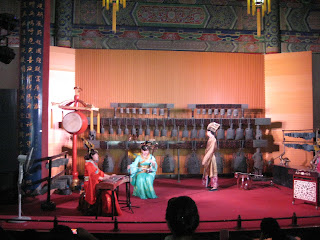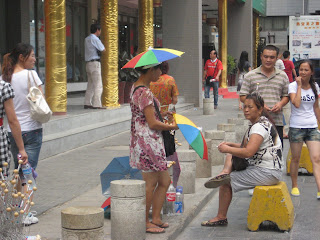In my recent trip to Asia, I encountered "Engrish" just about everywhere. For those of you who are unfamiliar with the term "Engrish", it refers to the incorrect translation of the English language found in many East Asian countries. Typically, this is found in the form of incorrect grammar or phrases that are completely lost in translation. In either case, it's quite funny and endearing at the same time. Here is my collection of "Engrish" photos to lighten up your mood and divert your attention away from BBC breaking news for a bit.
 |
| I bought this one for myself, it's too good! |
 |
| Here's an example of "lost in translation" |
 |
| ..This one too! |
 |
| Old yogurt? Erm, I'd rather have it fresh |
 |
| This one's a bit hard to read, it says; "The Pure Ecological Beer is suitability majority of people and all the seasons"..Huh? |
 |
| "Are you enemy?"..Should I be? |
 |
| I love the potato references, so random! |
 |
| The thought of climbing a dinner table in a restaurant never crossed my mind |
 |
| This one you can at least understand the gist of what they're trying to say. |
 |
| How to use a Western toilet, enjoy! |
 |
| This was in my hotel in Kuala Lumpur, Malaysia. Engrish is present there! |
As you can see, I was quite amused by all the quirky Engrish I stumbled upon during my trip. The English language is certainly not easy to learn, so I don't blame them for making mistakes, but it's the way they do it that I find so endearing. I can't help but smile when I see it.
Apart from English writing errors, there were quite a bit of cultural differences that stood out to me in China, some a bit shocking and others just plain quirky. Here they are for your reading pleasure:
1. Funny Hats
They really love their funny hats in China. I'm guessing this is mainly to protect their face from the sun, but not all the hats have this function. Maybe it's just their colourful way of expressing themselves? In any case, I'm a big fan of silly, so bring on the silly hats!
 |
| I saw loads of these hats being worn. I'm not quite sure of the purpose of them, they don't really protect your face from the sun |
Umbrella hat lady chatting with spider head massage hat lady
2. Men Wearing their Shirts Rolled up
This is a very common sighting in mainland China, men (of all ages) walking around with their shirts rolled up exposing their bellies. I'm guessing they do this to cope with the heat; it was approximately 36C and 80% humid everyday, so perhaps that's why. Or it might have something to do with just finishing a big meal and showing off a full satisfied belly? Either way, it was something that I noticed to be different from Western customs.
3. Bizarre Foods
This can be said for anywhere you travel outside your own country. Any foreign destination is bound to have "bizarre foods", and it's very subjective. There were definitely some "different" culinary delights --some of which I tried, others which I simply couldn't! Apart from the delicacies I found at the night markets,, here are some foods I personally found a bit bizarre:
 |
| I found that chicken head and foot in the chicken hot pot we ordered. The foot isn't all that uncommon, but the chicken head surprised me. |
 |
| The name of this popular drink in Hong Kong sounds appalling, but the taste is very similar to Gatorade or a Lucozade minus the extra sugary flavouring and food colouring. |
 |
| Dried crunchy squid, not quite the calamari we typically get at home. |
 |
| Dodgy looking dried sea cucumber |
 |
| Beijing night market delights |
 |
| Fried insects from the Beijing night market. I didn't see this in any of my other stops in China, so I'm guessing they have this just to freak out and entertain all the tourists, Western and Chinese. |
 |
| Local snail dish in Yangshuo. Snails are not that unusual, "escargot "is a common luxurious dish in France. But for some people this would seem "bizarre". I found it tasty, the snail meat reminded me of Middle Eastern lamb kofta. |
 |
| I saw this Borneo, roasted crunchy anchovy snacks --yum |
4. Spitting
Nobody forewarned me of the common occurrence of public spitting in mainland China. I noticed it on my first day in Beijing when a man walked right next to me, cleared his throat and spit on the ground. Of course my initial reaction was disgust, but I thought perhaps he's just recovering from a really bad flu and had no patience to be discreet. I'll just ignore it. But then it was every third person passing me by doing the same, men and women, young and old, on the street, and even in restaurants. It took me a few days to train my ears to block out the noise. I certainly won't let it damper my enthusiasm for everything I've seen and loved in China. But it is a strange custom that still baffles me.
Now in Hong Kong and Macau, it's completely the opposite, spitting is completely frowned upon and punishable by fine. I saw this mural in Macau which I found a bit amusing:
 |
| In Macau, a 600 HK$ (approx £60) fine can be issued for spitting |











































































